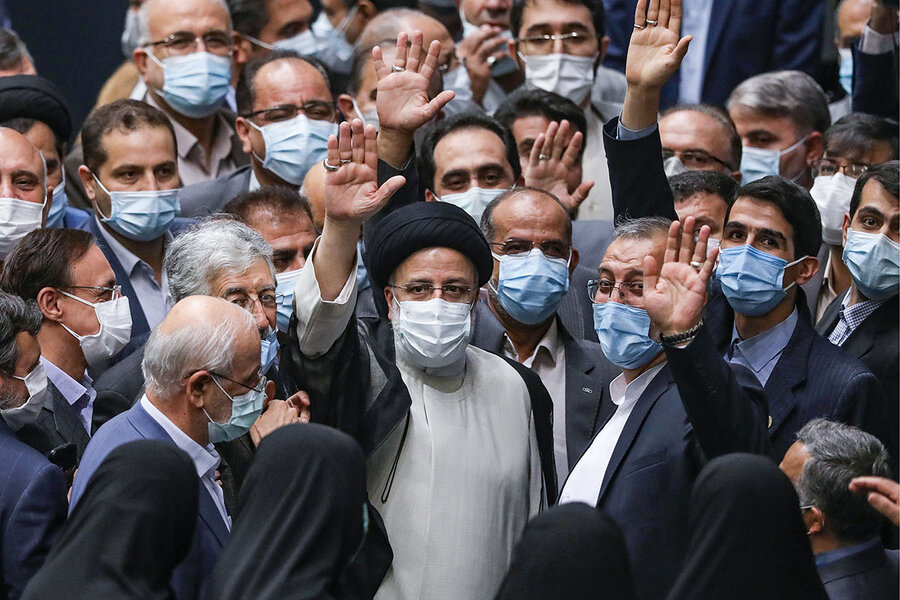What a hard-line Iranian president means for his country, and region
Loading...
| LONDON
The swearing-in of President Ebrahim Raisi signals the culmination of a hard-line Iranian political retrenchment that will reverberate deeply in the country and beyond. He assumes office under a cloud of illegitimacy, after winning a one-sided June vote that saw the lowest-ever turnout in an Iranian presidential race.
The ascent of the former judiciary chief – tainted further by his role in the execution of thousands of political prisoners in 1988 – puts conservatives in charge of all branches of government in Iran. Hard-liners will have no one to blame if they can’t revitalize a sanctions-wrecked economy and address Iranians’ corrosive sense of hopelessness for the future.
What happens to nuclear talks with the U.S.?
Why We Wrote This
Ebrahim Raisi’s swearing-in as Iran’s new president marks a shift from a moderate to hard-line perspective. Will that create tensions with the West? In nuclear talks, it may create an opening.
Unlike many hard-liners, President Raisi has never ruled out a return to the multilateral Joint Comprehensive Plan of Action (JCPOA), which the United States withdrew from in 2018 in favor of renewed sanctions.
Iran’s supreme leader, Ayatollah Ali Khamenei, rebuked outgoing centrist President Hassan Rouhani for trusting the West and getting burned by the deal.
Yet at his Aug. 5 inauguration, Mr. Raisi promised “smart engagement” to get “cruel and oppressive” U.S. sanctions lifted, and vowed to “support any diplomatic plan that achieves that goal.” He is likely to resume Vienna talks, now on hold after six rounds.
But progress may prove tough. Even if the U.S. were to lift all nuclear-related sanctions, many others may remain that relate to terrorism and other issues. And Iran, in turn, has pushed its nuclear program beyond the limits set by the JCPOA – for example, raising uranium enrichment to 63% purity, much closer to bomb-grade levels of 90%, and 17 times higher than the limit of the deal.
“The new Raisi administration is keen not to be seen as the reason behind a possible imminent collapse” of JCPOA restoration talks, notes an analysis by the Amwaj.media news website. But neither will Mr. Raisi likely back away from previous Iranian demands that sanctions relief be guaranteed upfront.
Will Iran’s support for regional militias be affected?
With hard-liners now in charge, analysts expect a boosted influence of the Islamic Revolutionary Guard Corps in Iranian politics and daily life.
That likely means greater “securitization” crackdowns at home – not unlike during the 2005-13 presidency of the archconservative Mahmoud Ahmadinejad – as well as support for its “axis of resistance” policy to counter U.S. and Israeli influence.
Critical tools for this have been Iran-backed militias. Their influence is so great across regional battlefields that the U.S. wants to rein them in – along with putting limits on Iran’s extensive missile program – in follow-on talks after restoring the nuclear deal.
Recent flare-ups include attacks on shipping in the Persian Gulf, with Iran using what the U.S. Central Command says are armed kamikaze drones that in late July killed two people on a ship owned by an Israeli businessman. In the past week there have been exchanges of missile fire with Israel from Lebanon, including 19 rockets fired by Hezbollah.
Iran says its proxy militias and missile arsenal are nonnegotiable. And with senior leaders of Hezbollah, Palestinian Hamas and Islamic Jihad, and Iraq’s Popular Mobilization Forces in the inauguration audience, Mr. Raisi last week praised their “resistance” and called the proxies a “source of security” for Iran.
How will Mr. Raisi cope with domestic challenges?
Any new Iranian president would inherit a near-insurmountable to-do list, and Mr. Raisi is not known for his management skills.
He has support from the very top, with some speculating that the cleric’s path to the presidency was paved – by weeding out reformist challengers, as well as conservative rivals – so that he might one day become Iran’s next supreme leader.
But Iran has seen widespread economic protests that left hundreds dead in recent years, as the currency collapsed and sanctions bit. Street protests have spiked in recent weeks over a water crisis in Khuzestan province that spread to multiple cities, with some shouting slogans against the regime, and security forces reportedly responding with birdshot and mass arrests that left at least 11 dead, according to Amnesty International.
And Iran has been hit especially hard by COVID-19. As the country faces its fifth wave, there is anger over the slow rollout of vaccines, with just 4% of the population inoculated.
Cases reached a new record this week, with state TV declaring that one Iranian dies every two minutes. The president’s official website posted photographs Sunday of Mr. Raisi receiving his first dose of the Iran-made vaccine, which is called Barakat, or “blessing.”







